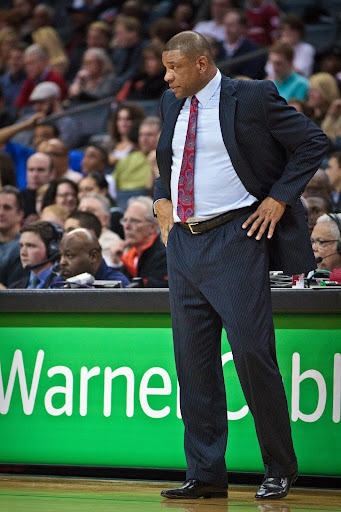On January 23rd, 2024, news broke that the Milwaukee Bucks fired their head coach Adrian Griffin. This came as a shocking revelation to most, as Griffin had led the Bucks to an impressive 30-13 record and the 2nd best record in the Eastern Conference. The Bucks had the greatest winning percentage for a team that fired its head coach during a season since 2015-2016.
The firing of coaches is unfortunately becoming a common trend across the league. In an era where the NBA revolves around star players and teams value immediate success, the coaching carousel spins faster than ever.
The 2022-2023 season epitomized this trend, as several NBA coaches were fired after failing to win a championship, highlighting the relentless pursuit of success at any cost: two of the most recent incidents involved Mike Buddenholzer (Bud) of the Bucks and Doc Rivers of the Philadelphia 76ers.

After the Bucks won the 2021 NBA Finals with Coach Bud, they had consistently been a top 3 seed in the Eastern Conference and secured the #1 seed heading into the 2022-2023 playoffs. Most fans deemed them as the favorites to win the championship, but they ultimately lost in the first round to the Miami Heat.
This loss could be attributed to a multitude of reasons. First, Miami’s star player Jimmy Butler completely elevated his game in the playoffs, averaging nearly 38 points per game (ppg) throughout the series. For reference, Butler averaged 23 ppg throughout the entire regular season. Second, the Bucks’ superstar Giannis Antetokounmpo suffered a back contusion and missed multiple games.
Lastly, Coach Bud’s brother died in a car crash during the series. This news was not at the forefront of public consciousness, as the majority of teams and fans pay attention to the on-court performance and neglect personal challenges. I cannot imagine how devastating this must have been for him, impacting not only his personal well-being but also his focus during a critical time in the playoffs.
Since the Bucks needed someone to blame for this loss, Buddenholzer was fired less than a week later. The coach that once led them to a championship was fired after one failed opportunity.
For the Philadelphia 76ers, this narrative unfolded somewhat differently. At the beginning of the 2020-2021 season, the 76ers hired Coach Doc Rivers. Rivers had championship experience, and the 76ers believed that he could help them with his expertise. However, Rivers only managed to get the team to the second round of the Eastern Conference for three straight seasons. These results were mind-boggling considering the level of talent on those teams, including Joel Embiid (2023 MVP), Ben Simmons, and James Harden (2018 MVP). Things worsened when rumors spread that Rivers failed to earn the respect of his players, ultimately leading the 76ers to fire him after the 2022-2023 season.
This illustrates the harsh reality of professional sports, where even a coach with a storied career and a proven track record can face extreme scrutiny when the team’s performance fails to meet the lofty expectations set upon them. What makes this story more puzzling is that after the Bucks recently fired Coach Griffin, they replaced him with Rivers. Coaching changes are a major gamble, and Rivers will be under immense pressure to deliver immediate success.
This pressure is worsened by the influence of social media, as a team’s performance can be heavily scrutinized and commented on in real-time. This instant feedback loop and hypervisibility ultimately creates a hostile environment where reactionary decisions such as firing a coach becomes the more frequent course of action. These seemingly quick fixes ignore the fact that true success requires patience and long-term development.
In traditional player-coach dynamics, the coach is the head of the snake while the players are the body that follows its lead. The coach should devise strategies, make real-time decisions, and keep the team together. However, coaches are now relegated to a somewhat marginalized position, simply being there because a coach is required. The new era of player empowerment shifted the dynamics: with star players signing supermax contracts worth well over $200 million, they have more control than ever before.
But as the famous saying goes, consistency is the key to success. This principle holds particularly true in professional sports, where seeking immediate fixes can spiral towards a continuous cycle of change without much success. Teams that value long-term vision over short-term gains will often find themselves in a better position to manage the ups and downs.
There is no better example of this than the Miami Heat. When Lebron James joined the Miami Heat in 2011, the team had a disappointing start with a 9-8 record. Rumors speculated that James wanted the head coach Erik Spoelstra to be replaced with the President and former head coach Pat Riley. Instead of succumbing to James’ desires as most teams would have, Riley supported Spoelstra and remained adamant on keeping him as the coach.
To his credit, the Heat made the finals four straight seasons and won 2 championships. Despite James’ eventual departure in 2014, Spoelstra led the Heat to three conference finals and two NBA Finals. This year, Spoelstra deservedly earned a record-breaking 8-year, $120 million contract from the Heat for his prolonged success.

The Heat’s sustained success, consisting of multiple finals appearances and championships, can be attributed to their unique strategy of emphasizing trust and patience in the era of player empowerment. Teams across the league could benefit from upholding these principles and following the blueprint laid down by the Heat. This organization is reaping the benefits of long-term over short-term vision, as they have successfully established a winning basketball culture. Embracing this philosophy could be the secret ingredient for a team aspiring to create a legacy of continued success in one of the most competitive sports leagues.

